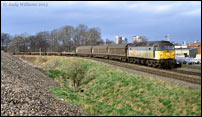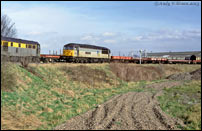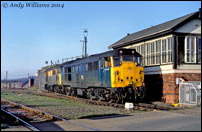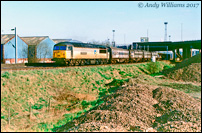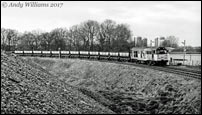The freight line between Bescot/Pleck Jct and Round Oak was closed with effect from Monday 22nd March 1993, and the last trains ran on Friday 19th March. When the end came there were still three sources of traffic on the line between Bescot and Stourbridge. The steel terminal at Wednesbury had closed in late 1992, but the spoil tip was still in use right to the end. The site was subsequently used for the Midland Metro tram depot and railway spoil traffic from Bescot was re-directed to the tip at Honeybourne.
The second source of traffic was the steel terminal at Round Oak. This was operated by Round Oak Rail, a private firm. Traffic here consisted of steel, mainly in the form of coil, mostly manufactured at Llanwern (Newport) and Port Talbot (Margam) in South Wales. Round Oak remains open to this day, and still receives trains on a daily basis. Trains must now reach Round Oak from the south, but as all the current traffic comes from South Wales this isn't much of a problem.
The third traffic source was Brierley Hill, a steel terminal operated by British Rail itself. It also handled steel, but mainly in the form of wire and rod. In 1993 most of Brierley Hill's traffic emanated from the Allied Steel & Wire (ASW) plant in Cardiff docks, although traffic from other sources (including imports) was routed through Bescot. Brierley Hill survived the 1993 line closure, and remained open as a steel terminal, with traffic from the north routed via Stourbridge.
Brierley Hill was mainly operated by EWS in the post-privatisation years. It led a chequered existence in the first decade of the 21st century, being closed and re-opened on a couple of occasions. In later years anything coming from northern locations other than Bescot would often run via Camp Hill, go down the Lickey, and run-round at Worcester before reaching Brierley Hill via Stourbridge. Trains from Bescot ran via Soho and Cradley Heath, running-round at Stourbridge Jct.
For a year or so in 2004/05 Brierley Hill received roadstone from Peak Forest, in addition to steel from Scunthorpe which was the staple traffic. However the stone trains ceased early in 2005, and in September 2006 Brierley Hill closed again - the Scunthorpe traffic having been diverted to Wolverhampton. There were also a few outgoing scrap trains to Southampton and Cardiff in the mid 2000s, but these never developed into a regular flow.
The loss of the steel traffic wasn't the end though, in the second half of 2007 stone trains started running from Croft Quarry (Leicestershire). Initially operated by EWS these trains went over to Freightliner Heavy Haul for their last couple of years. Although they ran sporadically the Croft trains were still operating as late as 2011, but when this flow dried up the terminal closed yet again.
In November 2016 Freightliner ran a couple of what appeared to be road-learning trips to Brierley Hill. By this stage the remaining sidings were impassable, overgrown with saplings and other vegetation. Only the access road nearest the running lines was usable, and the locos reversed there. Whatever the purpose of these trips was they didn't result in any subsequent trains.
There were further developments in the summer of 2017. This time plans emerged to run steel trains once more from a terminal in Kent, and some site clearance work was undertaken, primarily vegetation removal. The steel would be imported through a new facility at Thamesport operated by the the Armitt Group. Paths were created for GBRf to operate trains from Grain to Brierley Hill once the new terminal was completed, but it never happened. Dudley Council indicated that planning permission would be needed for the new development, and the proposal seemed to be abandoned at that point. After these two "false starts" Brierley Hill went back to sleep. Still connected to the network in 2021, but not having seen a train for a decade.
Meanwhile back in 1993, amongst the other traffic running via Wednesbury was 6E58, a steel service originating from the ASW plant at Cardiff. During the final months this was the only train booked to take the direct Wednesbury - Walsall route rather than go into Bescot. Another regular train was the china-clay service from St Blazey (near Par) in Cornwall to Cliffe Vale in Stoke-on-Trent. This was a long-standing railfreight flow which had no special reason to use the freight line through Wednesbury, other than the fact that it was the traditional and most convenient route. When the line closed it was simply re-routed to run via Bromsgrove, the Camp Hill line, Washwood Heath, Sutton Park and Walsall.
In its final years the line was busiest during the morning, and even at the end there was a reasonable amount of traffic early in the day. Afternoons were normally quieter. As in 1989 the signal boxes were still open Monday to Friday on a two-shift pattern, but although the line was nominally open until about 21:00 the loss of the evening Speedlinks meant that the man on the afternoon turn could often get away early. As can be seen from the table 6V70 was usually the last train of the day in 1993.
It should be evident from the movements recorded below that trains from the south were unable to get into the sidings at Round Oak due to problems with the signalling and trackwork there. Consequently these trains were routed into Bescot where the locomotive would run-round the train and head back south to Round Oak. This arrangement inflated the number of trains through Dudley and Wednesbury. Look out too for the problems involved in getting the final spoil train out of Wednesbury on Friday 19th. This also increased the number of movements that took place on the last day.
The tables below list all the movements through Wednesbury during the final week of normal service. Where the loco is shown in grey this indicates that this is the engine that should have worked the service according to the diagrams, but I wasn't able to confirm it. For the uninitiated the four-character train codes such as "6M11" are used to identify particular services. The first character identifies the type of train, the second character the destination (usually defined in very broad geographical terms) and the last two numbers are an arbitrary value to identify a particular service. The significant thing to note here is that codes starting with "0" such as 0T46 are locomotives without a train in tow - "light engines" in railway parlance. Those starting with any other number include one or more wagons behind the locomotive. On the line through Wednesbury "up" trains ran southbound (towards Stourbridge) and "down" trains ran northbound (towards Bescot and Walsall).
